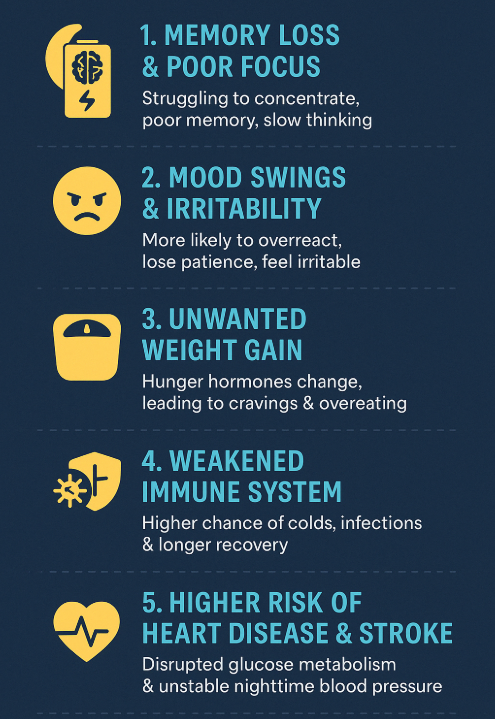I used to think “I’ll sleep later, just gotta finish this task” — until I started noticing all kinds of issues, physically and mentally. Only then did I realize: sleep deprivation doesn’t just make you tired, it affects almost every system in your body — brain, metabolism, mood, immunity, even reproductive health.
Here’s what I’ve learned, inspired by advice from Dr. Emily:
1. Memory loss & poor focus
Deep sleep helps your brain organize and process the day’s information — converting short-term memories into long-term ones.
Lack of sleep disrupts this, especially in the prefrontal cortex — the part responsible for memory, planning, and logical thinking.
Result? Struggling to concentrate, poor memory, slow thinking.
2. Mood swings & irritability
Ever snapped at someone over something small? I did — more than once. Turns out, sleep deprivation weakens emotional control.
You’re more likely to overreact, lose patience, and feel irritable for no clear reason.
3. Unwanted weight gain
Sleep affects appetite hormones: less leptin (fullness), more ghrelin (hunger) = cravings, overeating.
Plus, the brain’s decision-making center gets compromised → you reach for snacks more often, especially when tired.
4. Weakened immune system
Good sleep helps your body produce immune-supporting substances.
No sleep = reduced immune response → higher chance of colds, infections, and longer recovery time.
5. Higher risk of heart disease & stroke
Poor sleep disrupts glucose metabolism, increases visceral fat, and causes nighttime blood pressure instability — all of which raise your risk of hypertension, heart disease, and stroke, especially if you already have underlying conditions.
6. Emotional instability & depression
Low sleep = low serotonin & dopamine = low motivation, less joy, emotional numbness.
Over time, this imbalance may lead to depressive episodes, especially if left unchecked.
7. Reproductive health decline
For men: testosterone is mainly produced at night → poor sleep = lower testosterone, reduced fertility & libido.
For women: disrupted sleep affects ovulation cycles and hormone balance (FSH, LH, estrogen), making conception harder.
During pregnancy, chronic insomnia may increase the risk of preterm labor.

Final Thoughts
Sleep isn’t weakness — it’s maintenance.
Dr. Emily recommends 7–8 hours of sleep per night, sticking to regular sleep/wake times, avoiding screens & caffeine in the evening, and keeping stress under control.
If you’re still tired after “enough sleep” or constantly waking up in the night — go get checked. Don’t ignore it.
Sleep well, live better. 💪🛏️